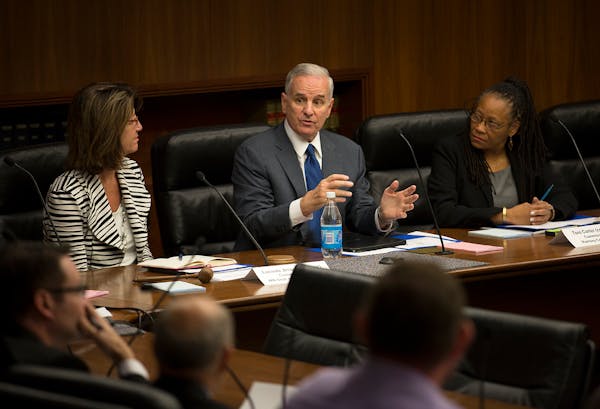A program that has become the state child-protection system's main method for safeguarding abused children drew sharp criticism from child advocates Wednesday.
Testifying before a task force charged with improving the system, advocates appointed by juvenile and family courts blasted the use of "family assessment" for serious abuse cases.
Alex Miller, a manager of state guardians ad litem in the southwestern part of the district, said that, for many children, "family assessment has failed."
"It continues [in cases] well past the point when it is clear when it is having no beneficial effects for a child," Miller said.
"Family assessment" began in the early 2000s as an alternative response for less serious abuse and neglect cases. Yet as the Star Tribune reported in October, since 2005 more than 20,000 cases of children deemed at "high risk" for more abuse have been routed into the program.
On Wednesday, social workers and county child-protection managers gave differing views of how family assessment is implemented across counties. Like an investigation, the program assesses whether a child is safe in the home. But in a family assessment, social workers do not investigate to determine if the reported abuse occurred, in hopes that families will be more willing to work with them.
What happens after that often differs from county to county. In some counties, records show, the services offered families to keep children safe are voluntary; in others, the social workers told task force members, they are mandatory.
A Star Tribune review of more than 400 child abuse cases found that family assessments resulted in cases being closed after parents rejected, dropped out of or failed services. Many of those children suffered more abuse.
Some county child-protection workers said closing cases after parents reject services should never happen.
"We view [family assessment] as a child-protection matter," said Bridgette VonCordes-Bertrand, a Yellow Medicine County social worker. "It is not a voluntary service."
Tim Parker, a social worker for Winona County, said he has seen instances where cases were closed after families rejected services. He said there is a place for family assessment but said it is being overused. He said it's being pushed by the state as an alternative to investigating child abuse because it lowers the overall rate of maltreatment findings.
"Overuse of family assessments often results in the child being framed by the abusive parent as being a storyteller and behaviorally disturbed," Parker said.
Other child-protection workers said family assessments work better than investigating abuse because it's more likely to keep a child safe.
"We're not about punishing people," said Jesse Stratton, a child-protection worker with Olmsted County. "We're about changing behaviors that will keep kids safe over the long term."
Some task force members said after the meeting that more study needs to be done on the use of the program before they can make any recommendations for how it can be improved. Initial recommendations are due the first week of December.
"We need to examine the fidelity to the original ideas of family assessment," said Robert O'Connor, a social worker professor at Metropolitan State University. "It's being done differently throughout the state. We have 87 different ways of doing it."
Brandon Stahl • 612-673-4626

Want to share info with the Star Tribune? How to do it securely

A Minnesota field guide to snow shovels: Which one's best?
Sign up for Star Tribune newsletters

